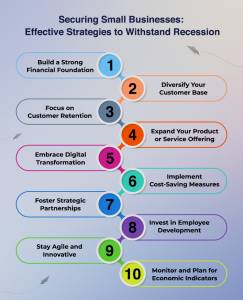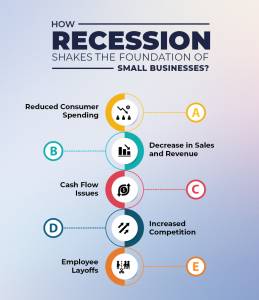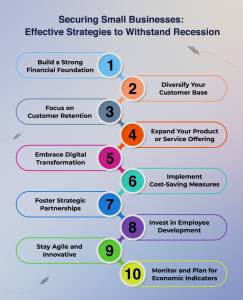
10 Strategies to Recession-Proof Your Small Business and Thrive in Challenging Times
NOW is the time to safeguard your business against the perils of the economic downturn.
Once the economy begins to decline, it might be too late to take action and steer your business toward survival and growth in the face of worsening conditions.
“Recession-Proof Businesses Are Those That Continually Evolve, Identifying New Opportunities, And Adapting to Changing Market Conditions.” -Gary Vaynerchuk
According to International Monetary Fund Chief Kristalina Georgieva, it is estimated that one-third of the global economy will experience a recession in 2023. Three of the world’s biggest economies, “The US, China, and Europe,” show signs of weaker growth, and the overall global economy seems to be reaching close to a recession.
As the economy heads into a recession, businesses will face a challenging landscape characterized by reduced consumer spending, declining demand, and financial uncertainties. So, they must adapt their strategies, manage costs, and explore new opportunities to navigate the downturn and emerge stronger on the other side.
Rosenblum motivates business owners to elevate their game by focusing on five crucial aspects:
- Refine and clarify your messaging
- Target and attract your ideal clients
- Implement a profitable business model to monetize your skills and knowledge
- Secure financing in advance for your business before you need it
- Lead your team and entire business
By any definition, recessions cause contraction in the economic output as consumer spending and business investment slump.
How Does Recession Impact Small Businesses?

A recession is a period of temporary economic decline characterized by a significant contribution to economic activities. These activities include declining customer spending, rising unemployment rates, and reduced business investments. According to a survey, nearly 75% of multinationals strongly agreed that an economic crisis is considered while planning advertising and marketing expenditures for 2023.
During a recession, small businesses face several other challenges that can significantly impact their operations and success. Here’s how a recession can affect small businesses:
-
Reduced Consumer Spending:
During the time of recession, as uncertainty looms, consumer behavior undergoes a significant shift. With financial uncertainty, people exercise caution in their spending habits. This change in consumer mindset puts forth a challenge for small businesses that offer non-essential products and services.
-
Decrease in Sales and Revenue:
As the number of consumers decreases, small businesses face the harsh reality of declining sales and revenue. This challenging scenario can be far-fetching, making it difficult for businesses to meet their expenses and generate a profit.
-
Cash Flow Issues:
In times of economic downturn, larger businesses face financial struggles, often delaying payments to their smaller suppliers. Unfortunately, it can damage small businesses, leading to severe cash flow problems.
As the bills pile up and employees rely on timely wages, it becomes difficult for small businesses to make payments.
-
Increased Competition:
Due to economic hardships, large businesses reduce prices or offer more competitive deals to attract customers. While this strategy may work in their favor, it can put small businesses at a disadvantage as they may struggle to compete with these bigger players.
-
Employee Layoffs:
During the recession, small businesses often have to cut costs to stay afloat. Regretfully, one of the measures they may resort to is reducing their workforce through layoffs. This unfortunate turn of events can lead to job losses and profoundly impact the morale and well-being of the affected employees.
Strategies to Recession-Proof Your Small Business

Don’t be afraid to seek advice or help if you need it!
Many resources are available to small business owners, from mentorship opportunities to government programs. Businesses can survive and thrive during challenging economic times by taking advantage of these resources.
Follow these tips on how to recession-proof your business and survive in economic crises:
1. Build a Strong Financial Foundation
To safeguard your small business from the impact of a recession, it is essential to implement key strategies. Building an emergency fund, reducing debt, and maintaining cash reserves create a financial safety net.
Effectively monitoring and managing cash flow and investing in financial planning and forecasting offer valuable insights and enable proactive decision-making. Additionally, exploring business insurance options provide added protection.
2. Diversify Your Customer Base
An impactful approach to recession-proofing your small business involves diversifying your customer base. By expanding your target market to encompass various demographics or industries, you can reduce reliance on a single customer segment.
This strategic move mitigates the potential impact of economic downturns, ensuring a more consistent revenue stream. Broadening your reach and catering to different customer segments enhances resilience, enabling your business to weather challenging times. And maintain stability in the face of market fluctuations.
3. Focus on Customer Retention
A vital strategy to recession-proof your business is nurturing strong relationships with your existing customers. You can enhance customer satisfaction and foster repeat business by delivering exceptional customer service, personalized experiences and implementing loyalty programs.
Investing in these efforts boosts customer retention rates, creating a stable base of patrons who continue to support your business during the economic downturn.
4. Expand Your Product or Service Offering
Expanding your product or service offering is a powerful strategy to recession-proof your small business. You can tap into new markets by analyzing market trends, identifying gaps, and developing new offerings aligned with the target audience.
With this strategy, you can attract a broader customer base and generate additional revenue streams, strengthening your business’s resilience during challenging times.
5. Embrace Digital Transformation
Small businesses can seize opportunities to enhance operations, expand reach, and optimize marketing in the digital landscape. Adopt digital transformation by establishing a robust online presence, investing in e-commerce, engaging customers on social media and forming app development partnership.
This enables quick adaptation to changing customer behaviors and ensures business continuity. The digital realm empowers small businesses to thrive in an ever-evolving market, connecting with a broader audience and capitalizing on the benefits of technology-driven solutions.
6. Implement Cost-Saving Measures
During a recession, effective cost management becomes extremely vital. You can identify areas for expense reduction without compromising on quality. And then streamline processes, negotiate with suppliers, and explore cost-effective marketing strategies.
By optimizing your cost structure, you can enhance profitability and bolster business endurance in challenging times. Embracing cautious cost management ensures financial stability while maintaining the value and integrity of your offerings.
7. Foster Strategic Partnerships
Collaborating with other businesses through strategic partnerships can yield mutual benefits in challenging economic times. You can seek out partnerships that can align with your goals and objectives. By pooling resources, sharing expertise, and accessing new markets, you can enhance business sustainability and create additional revenue streams.
Strategic partnerships can unlock opportunities for growth and innovation, fostering a competitive edge in the marketplace. These partnerships can help you navigate through uncertain times and spread your horizons across the globe.
8. Invest in Employee Development
Your employees are invaluable assets, and their development holds immense potential, particularly during a recession. You enhance their skills and knowledge by providing training programs, cross-functional opportunities, and a clear career path. Engaged and empowered employees are catalysts for your business’s success, playing a vital role in handling challenging times.
Investing in their growth and creating a supportive work ambiance cultivates a dedicated workforce ready to overcome obstacles and drive your business toward new heights.
9. Stay Agile and Innovative
Recession-proof businesses thrive on adaptability and innovation. Keep a finger on the pulse of market trends, customer preferences, and emerging technologies. Foster a culture of innovation that encourages employees to propose creative solutions and new ideas.
You can seize opportunities and conquer challenges in an ever-evolving business landscape by remaining agile, open to change, and adopting technology to grow. Adopting adaptability as a core principle empowers your business to navigate turbulent times, ensuring long-term sustainability and growth.
10. Monitor and Plan for Economic Indicators
Lastly, maintaining a vigilant watch over economic indicators and forecasts is crucial to stay informed about industry trends, market conditions, and potential policy changes affecting your business. Regularly review and update your business plan to align with the evolving economic landscape.
A keen awareness of the economic climate ensures your business remains robust and well-positioned to maneuver through dynamic market dynamics.
Conclusion
When business is booming, owners often get caught up in managing the day-to-day operations, neglecting the essential details. However, a slowdown presents a chance to reevaluate and tackle inefficiencies that accumulate over time.
Regardless of the economic conditions, small businesses must prepare for uncertainties. Practicing wise financial habits establishes a strong business foundation and ensures its viability in both challenging and favorable market conditions.
Implementing these proven strategies empowers your small business to emerge from the depths of a recession like a phoenix rising from the ashes. With strength, adaptability, and foresight, your business can thrive in any economic climate.
Featured Image Credit: Provided by the Author; Thank you!




